
Artificial intelligence is transforming businesses, but managing AI workflows often feels like juggling too many tools, rising costs, and governance headaches. This guide highlights seven platforms that simplify AI operations, offering solutions for tool overload, cost tracking, and compliance. Key players include Prompts.ai, Domo, and n8n, each addressing unique business needs.
Each platform focuses on improving efficiency, cutting costs, and ensuring compliance. Whether you're a small team or an enterprise, there's a solution tailored to your workflow needs.
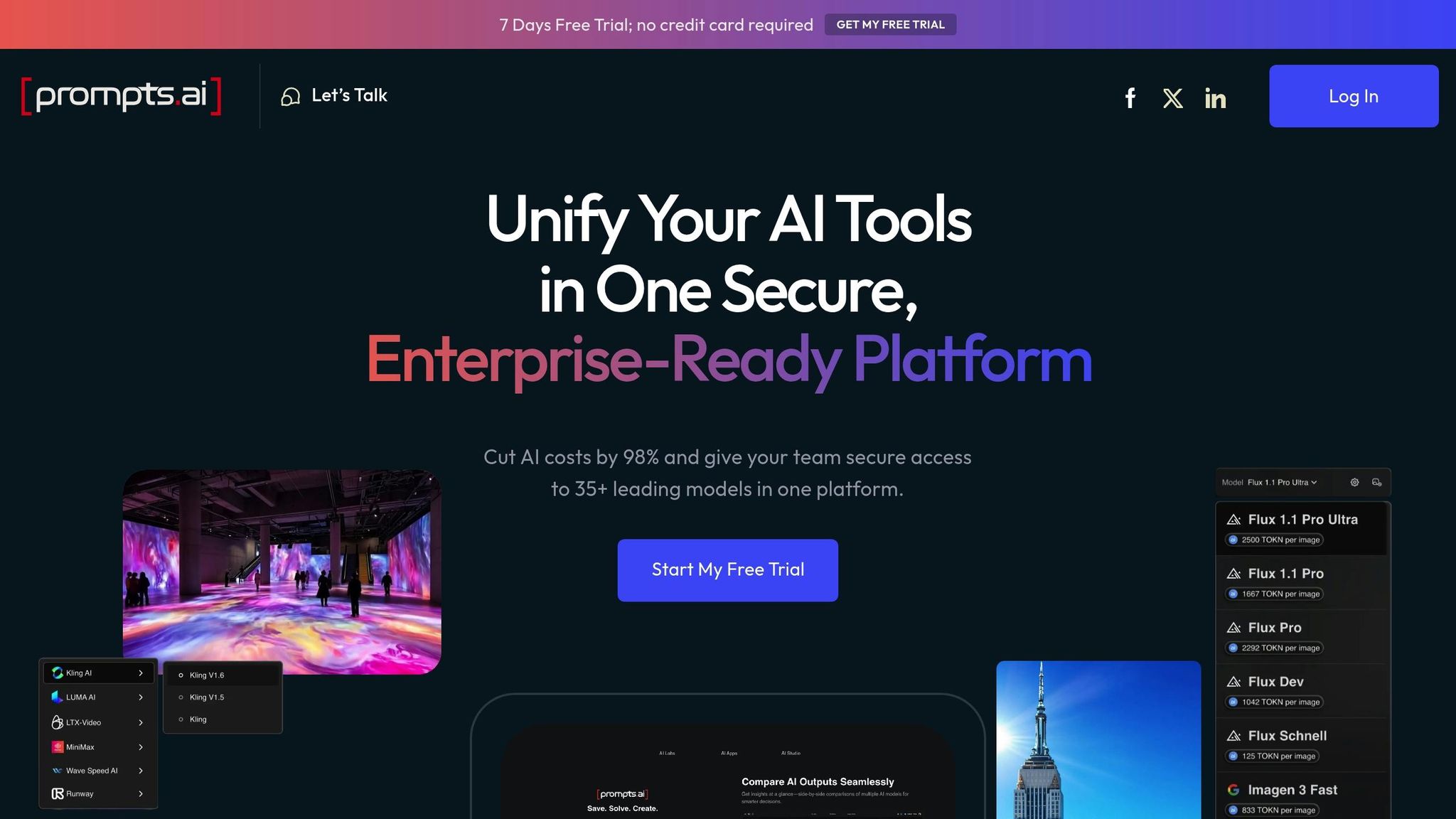
Prompts.ai is an advanced platform designed to simplify AI management for enterprises, addressing the challenges of managing multiple tools and ensuring proper governance. Instead of requiring teams to navigate numerous AI systems, it consolidates access to over 35 top-tier AI models - including GPT-4, Claude, LLaMA, and Gemini - within a single, streamlined interface.
One of Prompts.ai's standout features is its ability to eliminate the hassle of switching between different AI providers. Teams can work with leading AI models without needing separate accounts or learning new interfaces. Additionally, the platform allows users to compare outputs from various models side by side, enabling quicker iterations and more informed decisions.
In August 2025, Johannes Vorillon tested the platform’s capabilities using just three prompts and minimal editing. He highlighted how Prompts.ai enabled him to "iterate via multiple models simultaneously and compare renderings immediately".
Beyond seamless access to models, Prompts.ai’s automation features further enhance productivity by streamlining workflows.
Prompts.ai transforms AI tasks into efficient, repeatable processes through its built-in automation tools. It integrates with widely used business platforms like Slack, Gmail, and Trello, allowing users to set up automated workflows in seconds instead of hours or days.
Many industry leaders have reported significant time savings. For example, some have reduced rendering and proposal timelines from weeks to just one day by leveraging Prompts.ai workflows.
"Built his career crafting global brand stories across every medium imaginable. Today, he uses Prompts.ai to streamline content creation, automate strategy workflows, and free up his team to focus on big-picture thinking - while still keeping his creative edge sharp."
With its pay-as-you-go TOKN credit system, Prompts.ai offers an efficient way to manage costs. This approach eliminates the need for recurring subscriptions, aligning expenses directly with usage. The platform also provides real-time cost tracking, offering organizations a clear view of their spending across AI tools. For businesses on higher-tier plans, additional cost control features and usage analytics help optimize AI-related expenses.
Prompts.ai ensures robust governance for sensitive data, offering features like audit trails, access controls, and compliance frameworks that adapt to various models and applications. For teams working on collaborative projects, the platform’s Interoperable Workflows maintain strict security standards while enabling seamless cooperation across diverse AI processes.
This focus on security doesn’t come at the expense of scalability, as the platform is designed to support growing enterprise needs.
Prompts.ai is built to scale, supporting everyone from individual users to large enterprises. Higher-tier plans unlock unlimited workflow creation, allowing businesses to expand their AI operations without limits. Additionally, the platform includes tools for training and fine-tuning LoRAs, empowering teams to develop specialized AI agents tailored to their unique business needs.
"Founder of The AI Business, sees businesses struggling to implement AI efficiently. Instead of wasting time configuring it, he uses Time Savers to automate sales, marketing, and operations, helping companies generate leads, boost productivity, and grow faster with AI-driven strategies."
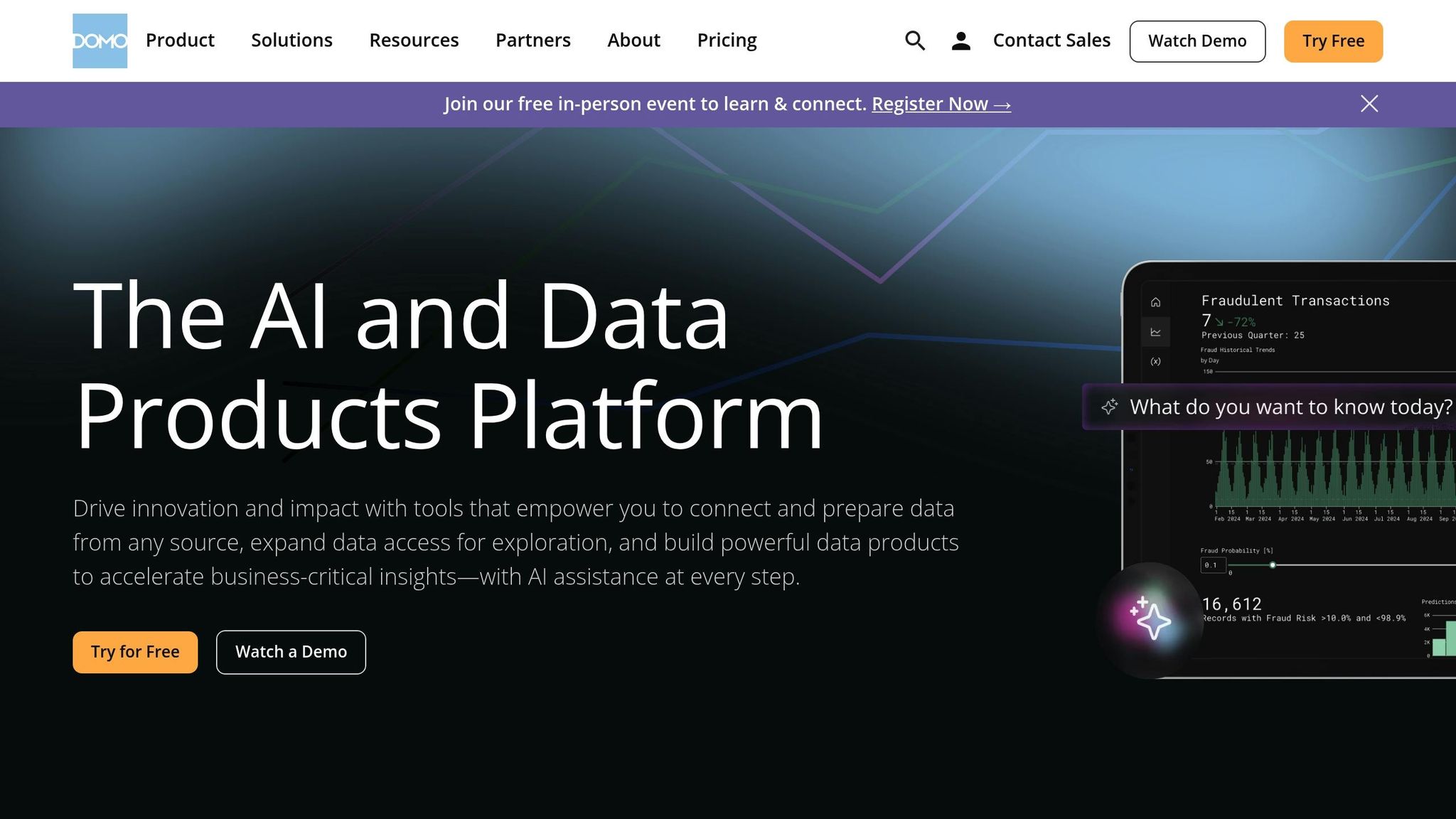
Domo stands out as a business intelligence platform that combines powerful AI workflow management with a proven track record. Recognized for 31 consecutive quarters as a leader across multiple categories in Fall 2025, it’s trusted by 32% of Fortune 50 companies.
Domo’s Workflows feature simplifies complex business operations with its low-code automation tools. By connecting platforms, users, and data, it enables seamless orchestration of data-driven processes. Its AI Agents take automation further by handling manual tasks, improving decision-making, and offering personalized experiences through real-time and historical data insights.
For instance, a major software vendor used Domo Workflows to automate customer onboarding with tools like automated forms, approval triggers, and service level tracking. Similarly, a global management consulting firm streamlined metadata analysis and notifications, while a security services company automated plan checks and mobile task generation, saving millions in the process. These examples highlight how Domo’s workflows integrate smoothly into its ecosystem for efficient operations.
Domo’s AI Service Layer supports integration with multiple AI models, including OpenAI, Bard, and custom-built solutions. These models can be embedded across workflows, dashboards, and even Jupyter notebooks. Additionally, its code-engine service tasks allow for external integrations or the application of custom logic within workflows, making it a flexible and scalable solution for diverse enterprise needs.
Domo is designed to handle high volumes of workflows without compromising performance. With AI-driven workflows expected to grow from 3% to 25% of enterprise processes by the end of 2025, Domo ensures businesses are prepared for this shift. The platform supports every stage of the machine learning lifecycle - from data connection and preparation to model deployment and performance monitoring - ensuring that actionable insights are seamlessly integrated into dashboards and workflows.
Domo places a strong emphasis on governance with its comprehensive framework that includes access controls and real-time monitoring to minimize errors and keep teams informed of critical updates. The integration of Domo Approvals adds an extra layer of oversight for sensitive AI-related decisions, ensuring accountability and security.
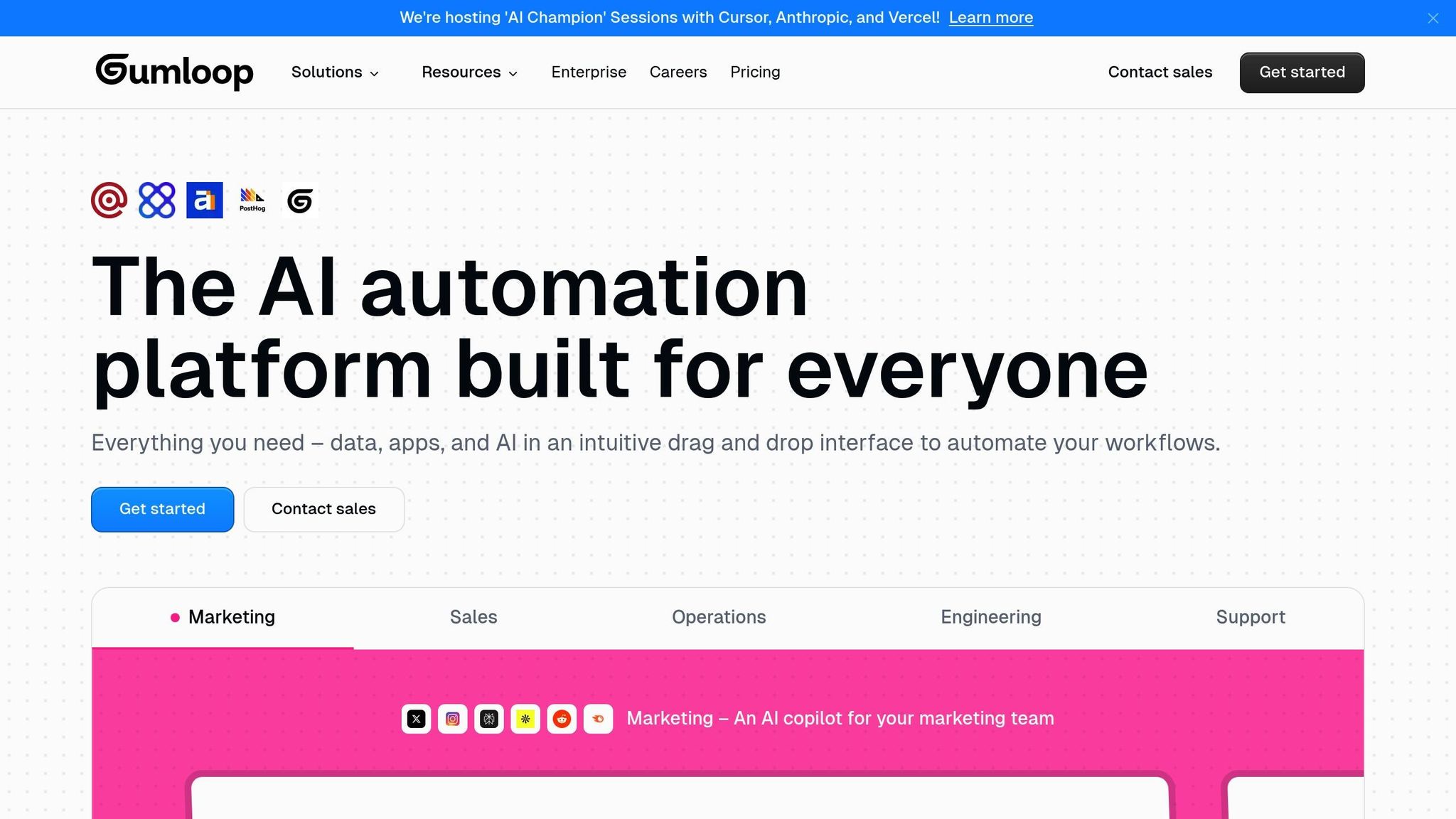
Gumloop is a no-code automation platform designed to empower business users to create intricate AI workflows without writing a single line of code. Its user-friendly interface and robust automation tools make AI workflow development straightforward and efficient.
At the heart of Gumloop is its drag-and-drop visual workflow builder, which simplifies the process of connecting various components. The platform supports multiple triggers, including scheduled events, webhooks, and manual inputs, making it adaptable to a range of use cases. Users can seamlessly combine AI models, data processing steps, and API calls into streamlined workflows.
One standout feature is its ability to handle complex conditional paths. Users can create branching workflows based on AI model results, data validation outcomes, or external factors. This functionality is especially useful for businesses managing diverse types of content or navigating varied customer scenarios through automated decision-making trees.
To ensure smooth operations, Gumloop offers real-time monitoring of workflows, allowing users to track their progress, pinpoint bottlenecks, and resolve issues as they arise. Detailed logs further enhance performance optimization and reliability. These automation tools help businesses keep costs under control while scaling operations effectively.
Gumloop integrates with a variety of AI providers, including OpenAI, Anthropic, and Google’s AI models. Through its model abstraction layer, the platform standardizes interactions across these providers, giving businesses the flexibility to choose models based on cost, performance, or specific capabilities. This compatibility ensures that users can tailor their workflows to meet unique business requirements.
Cost transparency is a key feature of Gumloop. The platform provides detailed usage tracking, enabling users to monitor expenses with precision. Spending limits and budget alerts help businesses stay within financial boundaries. Additionally, the cost breakdown tool identifies resource-intensive workflow steps, allowing for targeted optimizations.
Gumloop also supports batch processing, which groups similar requests to reduce costs. This feature is particularly advantageous for companies handling high volumes of similar data, as it lowers the overhead associated with individual API calls.
Gumloop is built to handle concurrent workflow executions effortlessly. It ensures that multiple workflows can run simultaneously without conflicts by automatically managing resource allocation and queuing. Businesses can count on consistent performance, even during peak demand.
The platform’s horizontal scaling architecture distributes workflow executions across multiple processing nodes. This setup prevents performance slowdowns as demand grows, making Gumloop an ideal choice for businesses with expanding automation needs. Its ability to scale seamlessly ensures efficient and reliable AI workflow management, no matter the size of the operation.
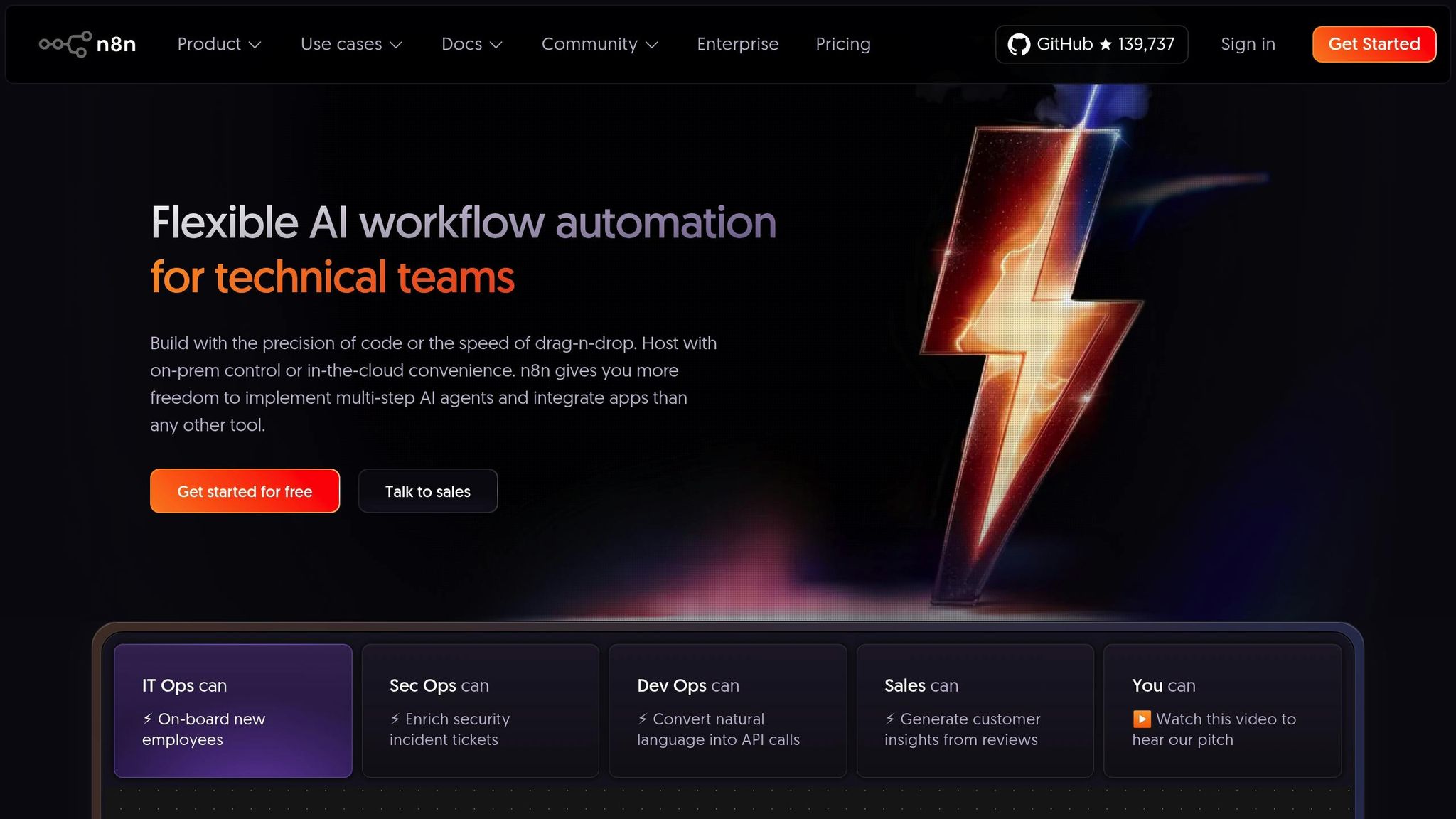
n8n is an open-source platform designed for workflow automation, giving users complete control over their AI processes. Unlike cloud-only solutions, n8n can be deployed on-premises or in private cloud environments, making it a strong choice for organizations with strict data regulations or those looking to avoid vendor lock-in. This deployment flexibility makes it well-suited for meeting demanding data governance and operational requirements.
n8n features a visual, node-based editor where each step in a workflow is represented as a node. With over 400 pre-built integrations, it connects seamlessly with popular AI services, databases, and business applications.
The platform supports advanced features like decision trees, error handling, and data transformation, which accommodate a wide range of AI model inputs and outputs. Real-time workflow triggering is enabled through webhook support, allowing workflows to activate immediately when new data arrives or specific events occur. Scheduled executions are also available for batch processing, providing flexibility for various operational needs.
With its HTTP request node, n8n offers universal connectivity to any AI service that uses a REST API. This allows users to work with a variety of AI providers, from major cloud services to custom-deployed models. Switching between providers or combining multiple models in the same workflow is straightforward, eliminating the constraints of pre-built integrations.
The platform also includes JavaScript code nodes for custom data preprocessing and postprocessing. This is particularly useful for AI models that require specific input formats or when combining outputs from multiple models. By enabling users to write custom code directly within workflows, n8n removes the need for external preprocessing scripts, streamlining the process.
Self-hosting with n8n eliminates licensing fees, offering a cost-effective solution for businesses. Detailed logging helps track API usage, enabling users to optimize resource allocation. This level of transparency is especially valuable for businesses using usage-based AI services, where costs can escalate quickly. The only expenses involved are related to infrastructure and maintenance, which can result in significant savings for organizations running high-volume AI workflows.
n8n’s self-hosted option ensures that sensitive data remains within an organization’s infrastructure, a critical feature for industries with strict regulatory requirements or those handling confidential information. All workflow executions, data processing, and AI interactions are managed within a secure environment.
The platform includes role-based access controls, allowing administrators to define who can create, modify, or execute workflows. This granular permission system balances security with team collaboration. Additionally, audit logging provides a detailed record of workflow modifications and executions, offering a clear trail for compliance purposes. Organizations can track who made changes, when workflows were executed, and what data was processed.
n8n is built to handle increased demand with ease. Its queue-based architecture supports horizontal scaling, enabling multiple worker nodes to process workflows simultaneously. This ensures that as workload increases, additional processing capacity can be added to maintain performance.
The platform’s database-backed execution system ensures reliability and persistence. Workflow states are stored in a database, allowing processes to recover from failures and resume where they left off. This is especially important for complex AI workflows that require extended processing times.
For deployment, n8n supports Docker and Kubernetes, making it easy to scale automatically and efficiently manage resources as needs evolve.
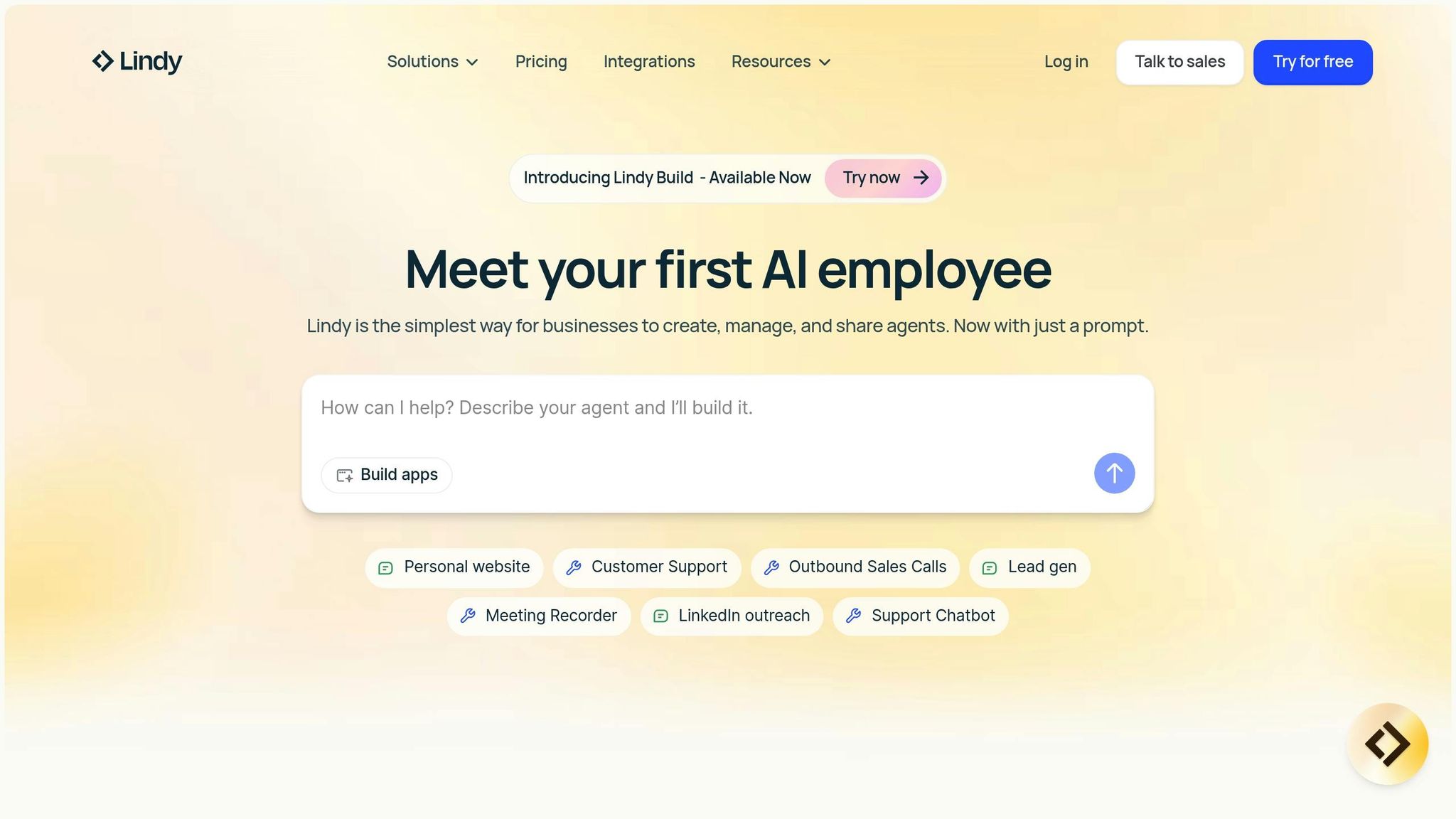
Lindy is an AI assistant designed to simplify business workflows using natural language. Instead of needing technical expertise to set up automation, users can describe processes in plain English, and Lindy translates these descriptions into automated workflows. This makes it accessible for non-technical teams while still handling the complexities of advanced business processes.
Lindy shines in creating automation workflows through natural language input. Users can outline multi-step processes - like data collection, analysis, and decision-making - and Lindy transforms these instructions into actionable workflows. It handles tasks such as email processing, extracting data from documents, qualifying leads, and routing customer support tickets.
The platform is particularly adept at intelligent decision-making within workflows. For instance, when managing customer inquiries, Lindy can assess the content, prioritize based on urgency, assign messages to the right team members, and even draft initial responses using company knowledge bases.
Another standout feature is its ability to make real-time workflow adjustments. If unexpected data formats or scenarios arise, Lindy adapts on the fly instead of stalling or requiring manual fixes. This adaptability is especially useful for businesses dealing with diverse data sources or constantly changing requirements. By integrating seamlessly with existing systems, Lindy enhances data workflows across various business applications.
Lindy takes a model-agnostic approach, ensuring it can work with the best AI tools for each task. For example, it might use specialized text analysis models for document processing and different machine learning techniques for data classification. This flexibility ensures top-tier performance across various workflow components.
The platform integrates smoothly with existing business systems through API connections and data synchronization. It can pull data from CRM systems, update spreadsheets, interact with email platforms, and connect to databases - all without requiring complex technical setups. Lindy manages the behind-the-scenes challenges of handling different data formats and API structures.
Lindy’s pricing is based on a usage-driven model, meaning businesses pay only for the workflows they execute. This approach allows for predictable cost management, especially during fluctuating workflow volumes.
To help businesses track expenses, Lindy provides detailed usage analytics. These reports break down costs by workflow type, volume, and resource usage, giving organizations insight into their most efficient processes. Armed with this information, businesses can better allocate resources and refine their automation strategies.
Lindy prioritizes secure and auditable operations, offering role-based access controls to define which team members can create, edit, or execute specific workflows. This ensures sensitive processes remain protected while enabling team collaboration on automation efforts.
The platform also maintains audit trails for all workflows, recording actions, timestamps, and data usage. These logs support compliance requirements and provide transparency into how decisions are made.
To safeguard sensitive information, Lindy implements robust data handling protocols. It uses encryption for data both in transit and at rest and can be configured to handle varying levels of data sensitivity.
Built on a cloud-native architecture, Lindy automatically scales its processing power to meet workflow demands. During busy periods, it allocates additional resources to maintain performance, and during slower times, it scales down to keep costs in check. This ensures reliable execution no matter the workload.
The platform supports parallel workflow execution, allowing multiple processes to run simultaneously without slowing down. This is particularly beneficial for businesses managing numerous workflows or processing large datasets.
Lindy also offers workflow templates and replication tools, enabling organizations to expand automation quickly. Once a workflow proves effective, it can be duplicated and tailored for similar tasks, making it easier to deploy automation across teams and departments.
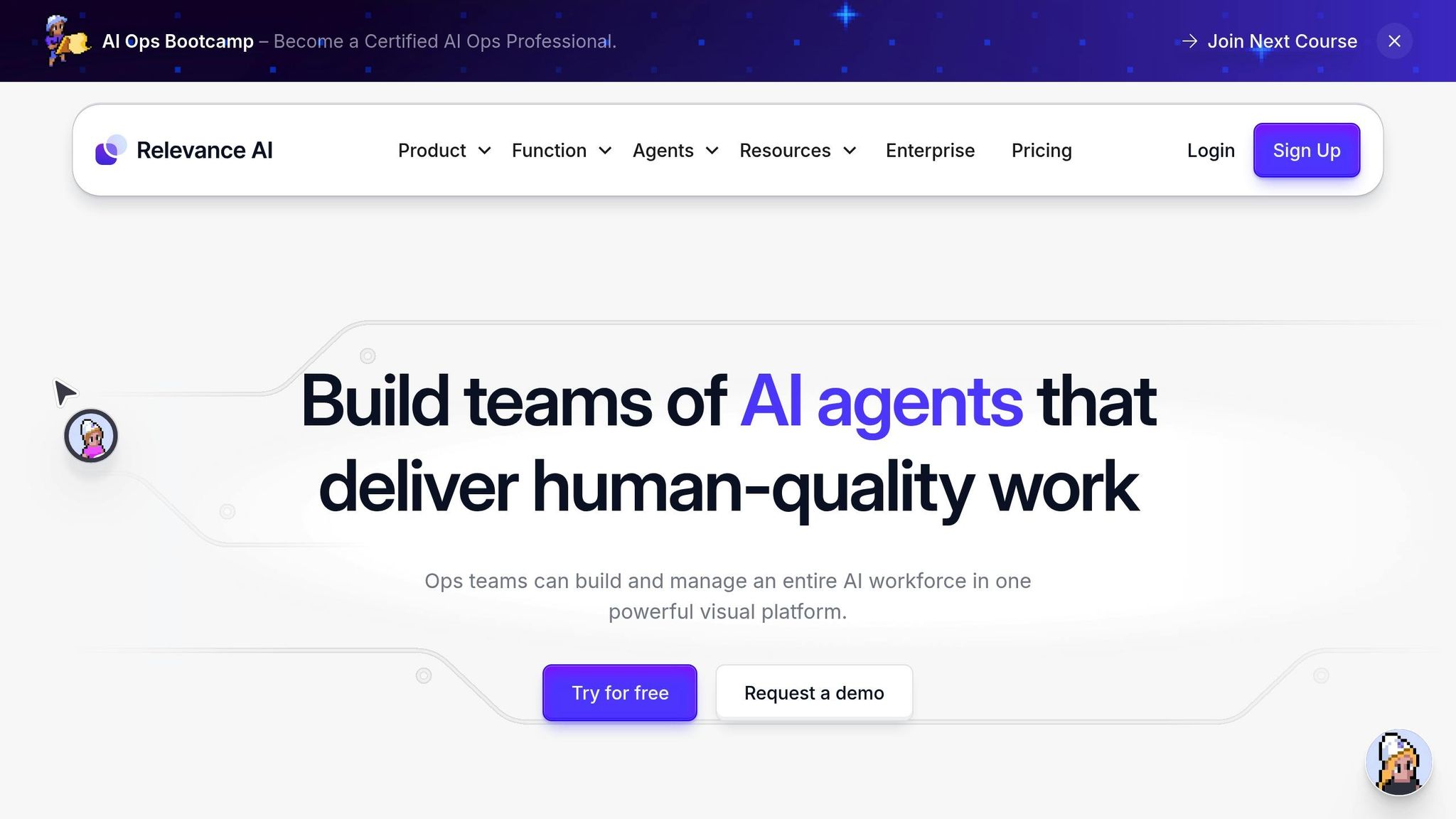
Relevance AI offers a platform designed to build and deploy AI-powered workflows with ease. Its model-agnostic framework ensures businesses can work seamlessly with a variety of AI providers, maintaining flexibility across systems.
Relevance AI supports a wide range of Large Language Model (LLM) providers, such as OpenAI, Anthropic, Cohere, PaLM, Claude, and Gemini, giving users the freedom to choose models that best suit their needs. The platform also accommodates requests for additional providers, ensuring businesses aren’t confined to a single AI ecosystem. Beyond integrating LLMs, its Tool Builder enables users to create custom AI tools. This includes setting up LLM prompt chains, automating traditional workflows, connecting to external APIs, or running custom code.
Relevance AI simplifies workflow automation by embedding AI processing into existing business systems. Tasks like data handling and customer engagement are automated, allowing businesses to save time and improve efficiency.
The platform integrates seamlessly with over 2,000 business tools and technology stacks, making it highly scalable. It connects with CRMs like HubSpot and Salesforce, communication platforms such as Gmail and Slack, ERP systems like SAP and Oracle, and e-commerce solutions including Stripe, PayPal, and Shopify. Additionally, it supports data analytics tools like Power BI, Google Analytics, and Tableau, as well as workflow automation platforms such as Zapier, Make, and n8n. This extensive ecosystem allows businesses to extend their AI workflows across a wide array of systems.
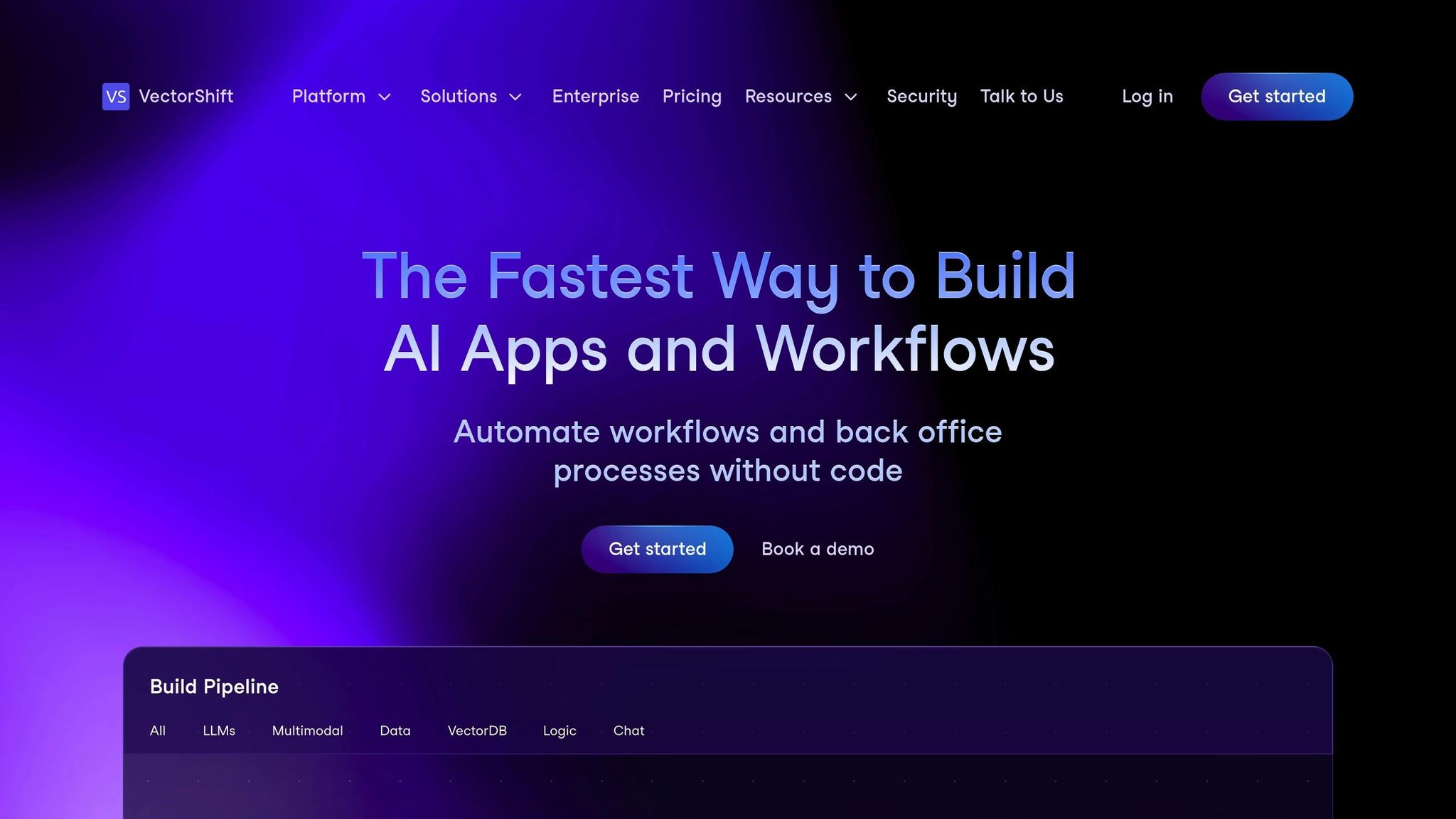
VectorShift is designed to simplify the creation and deployment of AI workflows through an intuitive, drag-and-drop interface. By catering to both technical experts and those without a technical background, it bridges the gap between accessibility and enterprise-level functionality. Let’s explore its standout features.
One of VectorShift’s key strengths is its ability to integrate with multiple AI model providers, bringing together a variety of tools in a single workflow. Whether you're working with text generation, image processing, or data analysis models, the platform allows seamless switching between providers. This flexibility ensures users can adapt workflows to fit specific tasks, budget constraints, or performance goals without starting from scratch.
Its model-agnostic design makes it adaptable for diverse applications, solidifying its role as a versatile tool for AI deployment.
With its visual workflow builder, VectorShift empowers users to design intricate AI automation pipelines with ease. The drag-and-drop functionality simplifies the creation of multi-step workflows that can include everything from data preparation and AI model execution to post-processing and integration with external systems.
The platform also supports conditional logic and branching, enabling workflows to make decisions based on AI outputs or inputs from external sources. This feature is crucial for building dynamic automation that can handle a variety of scenarios and unexpected conditions seamlessly.
VectorShift is built for scalability, offering cloud-based deployment that adjusts resources automatically based on data volume. Whether handling batch processing for large datasets or real-time tasks for interactive applications, the platform delivers consistent performance.
It integrates effortlessly with widely-used business tools and databases, and its API-first approach ensures smooth custom integrations. This makes it easy to embed AI capabilities directly into existing systems, enhancing overall efficiency and functionality.
AI workflow management platforms come with their own sets of strengths and challenges. Understanding these factors is crucial for organizations to select a solution that matches their technical expertise, operational demands, and long-term objectives.
Prompts.ai stands out by offering access to over 35 top AI models through a single, secure platform. This setup can potentially slash AI costs by as much as 98%, while also ensuring strong security measures and governance protocols. Additionally, its onboarding and training programs are designed to streamline enterprise-level adoption.
Here's a quick overview of the platform's key benefits and considerations:
| Platform | Key Advantages | Considerations |
|---|---|---|
| Prompts.ai | Access to 35+ AI models, up to 98% cost savings, enterprise-grade security and governance | Comprehensive onboarding and training simplify adoption |
Balancing these factors - such as integration, automation, cost efficiency, and security - will help ensure your AI workflows align with your organization's broader goals.
Selecting the right AI workflow software hinges on your specific needs, technical capabilities, and long-term growth strategy. Each platform reviewed addresses key pain points like tool overload, cost control, and security, but their strengths align differently depending on the user.
For enterprises, Prompts.ai stands out with its unified access to over 35 AI models, potential cost reductions of up to 98%, and enterprise-level security features. Its pay-as-you-go TOKN credit system eliminates recurring fees while providing real-time expense tracking, making it an appealing choice for organizations aiming to scale operations without overspending.
Smaller teams or budget-conscious groups will appreciate solutions that prioritize transparent pricing, consolidating multiple subscriptions into a single, manageable cost structure. For organizations with limited technical expertise, platforms offering thorough onboarding and accessible support are invaluable. Conversely, teams with advanced technical skills may gravitate toward tools that allow for greater customization and flexibility.
Small teams often seek simplified interfaces and rapid setup processes, while larger enterprises demand features like governance controls, audit trails, and multi-user management to ensure operational efficiency.
When evaluating options, consider how well the platform integrates with your existing tech stack, its ability to scale alongside your growth, and its adherence to security and compliance standards. The ideal AI workflow management tool should simplify operations, not complicate them - allowing your team to focus on driving innovation and achieving measurable results rather than juggling disconnected tools or uncovering hidden costs.
To ensure a smooth transition, consider starting with a pilot program to test compatibility and integration before committing to a full-scale deployment. This step can help confirm that the solution aligns with your business objectives and operational needs.
Prompts.ai consolidates access to over 35 top AI models into one unified platform, cutting down on the hassle and expense of juggling multiple subscriptions. By streamlining your operations, it simplifies management and helps you save money.
Using pay-as-you-go TOKN credits, Prompts.ai can slash costs by as much as 98% compared to conventional methods. The platform also provides real-time tracking of token usage, ensuring full transparency and giving you better control over expenses. This all-in-one solution reduces hidden fees and makes managing AI workflows more cost-effective and straightforward.
Prompts.ai places a strong emphasis on safeguarding your data with enterprise-level security and strict governance protocols. By utilizing end-to-end encryption, the platform ensures your data remains protected whether it's being transferred or stored. Additionally, its zero-trust security model adds an extra layer of protection by verifying every access request, reducing potential vulnerabilities.
For compliance and oversight, Prompts.ai integrates role-based access controls, centralized management tools, and comprehensive audit trails. These features provide the tools you need to oversee and manage data usage efficiently, aligning with rigorous regulatory requirements and supporting professionals managing sensitive AI workflows.
Prompts.ai is built to work effortlessly with the tools and workflows your business already relies on. For example, it’s compatible with platforms like the Microsoft Power Platform, enabling you to embed AI prompts directly into Power Apps and streamline tasks through Power Automate.
By bringing together more than 35 leading AI models into one cohesive interface, Prompts.ai eliminates the headaches of complex deployments and high costs. Its unified APIs, low-code tools, and real-time cost tracking make it simple to scale, optimize efficiency, and maintain security - all while seamlessly integrating with your current systems.


